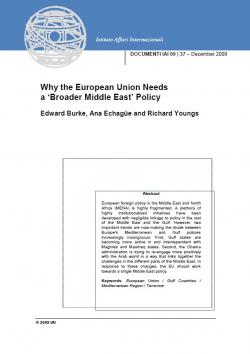Why the European Union Needs a 'Broader Middle East' Policy
European foreign policy in the Middle East and North Africa (MENA) is highly fragmented. A plethora of highly institutionalised initiatives have been developed with negligible linkage to policy in the rest of the Middle East and the Gulf. However, two important trends are now making the divide between Europe’s Mediterranean and Gulf policies increasingly incongruous. First, Gulf states are becoming more active in and interdependent with Maghreb and Mashreq states. Second, the Obama administration is trying to re-engage more positively with the Arab world in a way that links together the challenges in the different parts of the Middle East. In response to these changes, the EU should work towards a single Middle East policy.
Documento presentato al seminario "The Mediterranean: Opportunities to Develop EU-GCC Relations?", Roma, 10-11 dicembre 2009, organizzato dall'Istituto Affari Internazionali (IAI) nell'ambito del progetto Al Jisr. Pubblicato in: Roberto Aliboni (ed.), The Mediterranean: Opportunities to Develop EU-GCC Relations?, Roma, IAI, 2010, p. 13-29 (IAI Quaderni English series 18) e in FRIDE Working Papers No. 93 (February 2010).
-
Dati bibliografici
Roma, IAI, dicembre 2009, 23 p. -
In:
-
Numero
09|37
Introduction
1. The Gulf in the Mediterranean
2. Obama’s Re-engagement
3. Joining the Dots
3.1 Iraq, Iran and Regional Security
3.2 Palestine
3.3 Trade Relations
3.4 Responses to the financial crisis
3. 5 Energy
3.6 Counter-terrorism
Tema
Tag
Contenuti collegati
-
Ricerca20/01/2015
Cooperazione tra Europa e paesi del Golfo
leggi tutto




